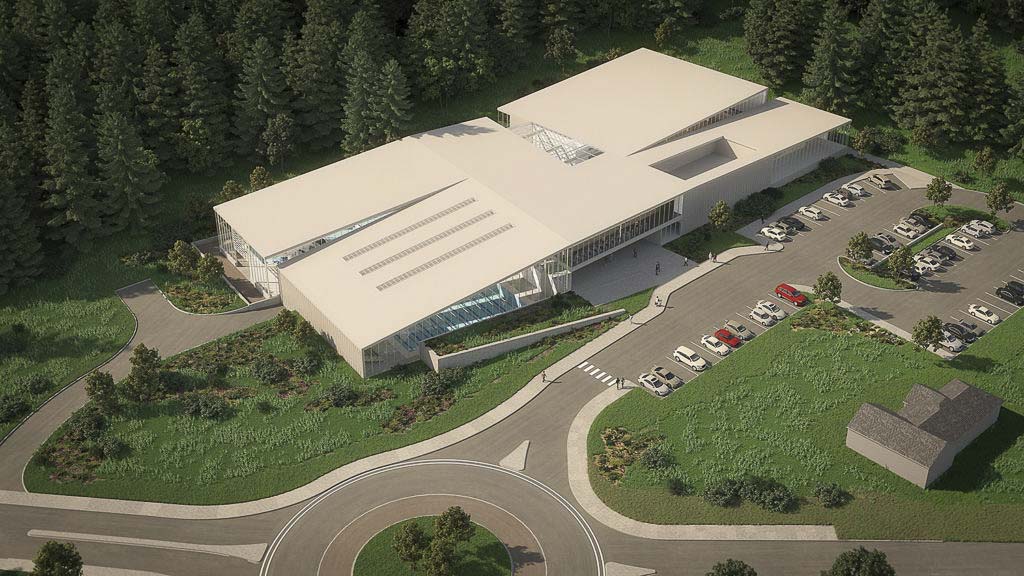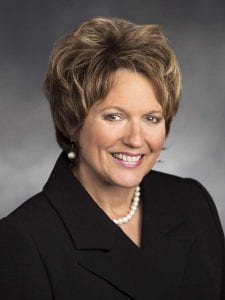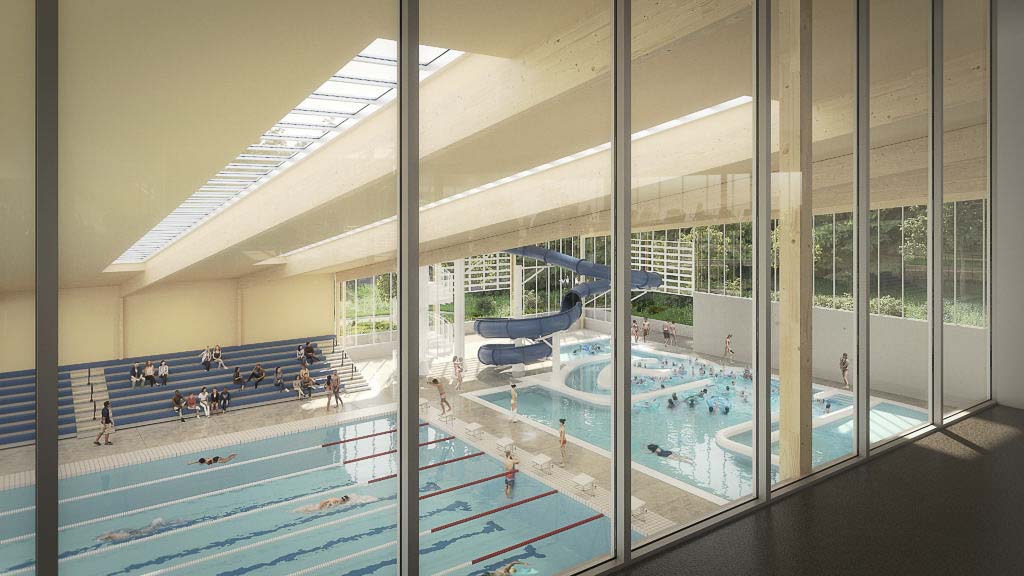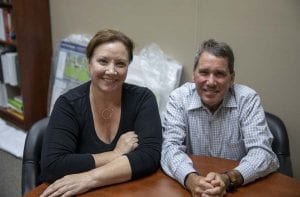Citizens’ concerns on $78 million bond grows as city asks for trust
CAMAS — Proposition 2 in Camas, better known as the “Pool Bond,” proposes the construction of a community aquatics center at a cost of $72 million. The proposal is drawing criticism from some in the community for its potential cost and impact on the city.

Since members of the Camas City Council approved the $78 million bond levy in July after selecting the proposed center’s design, the Committee Against the Camas Pool Bond has formed, backed by the Camas Taxpayers Alliance. Just to clarify, the $78 million bond covers the $72 million for the aquatics center and $6 million for renovations to other facilities.
The group has compiled a website as well as placing signage around the city in favor of a “no” vote on the proposition. The city also has created a website, offering their view of many of the same topics surrounding the center’s construction.
If built, the 78,000-square-foot center would feature an eight-lane lap-swimming pool, a recreational swimming pool, a multi-purpose gym, and 3,000-square-feet of community spaces.
Among the most contentious subjects are overall cost, as compared to other options, ongoing tax and operation costs and the potential issues around traffic in the selected area; just across from Lacamas Lake and Heritage Park, between NW Sierra Street and NE Everett Street.

“I live just outside the city of Camas, but if I were in the city, I’d be voting no on the proposed $78 million city owned swimming pool,” said previous 18th Legislative District Rep. Liz Pike in an email. “Residents are already overtaxed today between local levies for fire districts, local school levies and bonds, libraries, and enormous never-before-seen gigantic property tax hikes passed by the Washington State Legislature to fund public education increases.”
With regard to overall cost, city leaders explained that they see the large scale project as an investment in the long-term future of the community, as opposed to a short-term fix.
Many have pointed to the juxtaposition of replacing Camas’ aged Crown Park Pool, which was demolished earlier this year. Replacing and maintaining a new pool at Crown Park was estimated at $1.8 to $2.2 million, with similar yearly operating costs to the existing pool.
“For $2 million, we could have made renovations on the existing 65-year-old pool, with a very questionable life to that particular facility,” said Camas City Administrator Pete Capell. “And so it just didn’t seem like a very good investment. Plus, with the outdoor pool, you only get 10 or 11 weeks out of the year where you’re able to swim. So it really isn’t fitting the needs of the people that are desiring a year-round pool for swimming and exercise and competition and all of those sorts of things.”
The city has cited several surveys conducted over the last two years, in which many residents expressed a desire for a community center. Camas Mayor Shannon Turk also pointed to the growth in population as a reason for not pursuing a Crown Park project.
“It was located there back when there were 5,000 people in Camas, now we have 25,000,” she said. “There was not the infrastructure in place to be able to accommodate all of those people, because when you put something new people flock to it.”
Turk also said in her experience working for the city of Vancouver, stand-alone pool facilities do not recover well, and thus need additional amenities to attract members and pay for operations.
The argument has also been made regarding the often lower costs of comparable facilities in the region. As one writer for the bond’s opposition pointed out, privately-owned Lacamas Athletic Center has analogous amenities and was offered to the city for just over $5 million; $67 million less than the estimated cost of the center itself.
“It’s not government’s role to build recreational aquatic centers that unfairly compete with the private sector,” Pike said.
Capell and Turk compared the project to the Firstenburg Center in Vancouver, which was designed by OPSIS; the same team designing the proposed center in Camas. Adjusted for inflation and construction costs, the cost of the Firstenburg Center was roughly $35.6 million. The building cost for the Camas design comes in at $37.2 million.
“So in their mind the costs are, you know, very competitive and very similar, just with the escalation of construction dollars,” Capell said. “The other things that drive things is that it’s necessary to do a lot of street improvements on Lake Road that they [Firstenburg] didn’t have to do on 136th.”
Capell also expressed that additional parking and updates to Heritage Park are factored into the bond, and are needed outside of connection with the proposed center.
Tax and operation costs also have some in the community nervous, with residents paying $1.04 per $1,000 assessed property value each year for the next 20 years. This equates to $474 per year for a household with a property value of $464,000; the median assessed value in Camas, according to the city’s site.
The Committee Against the Camas Pool Bond points out that this will also mean an increase in rents and could cause affordable housing to become more scarce, as well as placing a burden on local businesses.
“Instead of building extravagant public swimming pools that most citizens cannot afford, I recommend city leaders focus on attracting more family wage jobs to our industrial areas so that more residents can work where they live,” Pike said. “In doing so, more industries will help shoulder the property tax burden now crushing many of our working families. More good jobs in Camas will also reduce commuter traffic on SR-14 and across the river into Oregon.”

Turk said she believes the center would in fact add jobs and allure for companies, since a center would add to the community, making it more than a collection of neighborhoods. This would afford residents more job opportunities close to home, she said.
“It should increase the values when you have more things happening in your community, your property values increase, the families come here, they want to work close,” Turk said. “I think it’s a negligible impact.”
Capell also explained that while the proposition is on the ballot this November, it will not go on the tax rolls in 2020. This is because of the library and school levies expiring in 2021 which is the same time construction would begin on the center. With the school’s totalling $1.32 and the libraries at 12 cents a reduction of $1.44 is expected to counter the increase from the center, he said.
“Camas has a history of going big on these bond measures,” Turk said. “It is a big ask, but when we do big things in Camas, good things happen.”
Opposition has also made note of possible membership costs at the center being high. According to the committee’s site, user fees could exceed $700 a year for a Camas family. The Firstenburg Center currently charges $693 for a resident annual family pass and $781 for non-resident.
Turk and Capell responded saying they do not currently have numbers on possible fees, and that many variables and assumptions are involved in calculating such a number.
“What I can guarantee is that Camas residents will pay less in membership and recreation fees because they’ve invested in the building and that is existing council policy,” Turk said.
On the subject of traffic and location, opposition has stated they believe the chosen site is a possible landslide risk, as well as very near a known traffic bottleneck at NW Lake Road and NE Everett Street.
They also assert the location was chosen over others in a “rush to finalize the $78-million bond.”
Turk and Capell explained that these issues will be assessed by advisory committees, builders and through studies if the project passes.
“If there’s a problem with that site, we’ve got other locations that were already considering,” Capell said. “Will move it, you know, we’re not locked into anything. The only thing that we’re locked into is it’s going to be less than $78 million.”
Capell elaborated on the fact that the traffic circle improvements to be done at Lake Road and Everett Street, are already approved and will be funded separately from the bond. 242 new parking spaces will be added, and more detailed analysis will be conducted on the site, he said.
Potential deficits in operating cost versus revenue are also a concern for some. City leaders likened the possibility to policy in Vancouver as well as the past situation at Crown Park Pool, which was being subsidized by the city up until it’s retirement.
“I think that’s similar to operation of other community centers like, in Vancouver council policy is they recover 70 percent of their operating costs,” Turk said. “I imagine that Camas would do something similar as a financial goal. The world doesn’t stop spinning if they don’t reach 70 percent, but they definitely try to.”
Opposition has stated they feel many of the comments made about location safety and traffic congestion have not been a high priority. City leaders have responded saying they want to focus on those components after people choose to approve the bond or not.
“To some people, they see where it adds value to the community, and it’s an amenity that they will enjoy themselves, so they’re going to vote yes,” Capell said. “There will be other people that may not use it, but see it as an asset for the community, and they’ll vote yes. And then there’s going to be people that see that it’s not an asset for the community, and it doesn’t add value to me, and if that’s your opinion, then I’m going to say, ‘vote no,’ but I can’t make that decision for you.”
The next community open house on the subject of the proposed Community Aquatics Center and Proposition 2 will be held at Lacamas Lake Lodge on Wed., Oct. 2 from 5:30 p.m. to 7:30 p.m. For more information visit camascommunityaquaticscenter.com.





